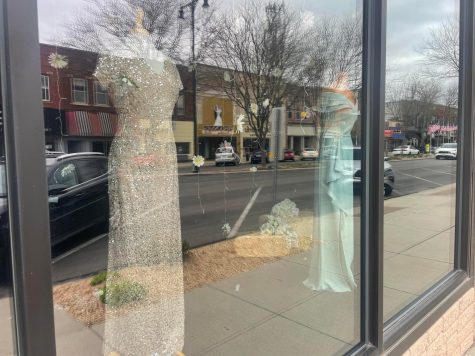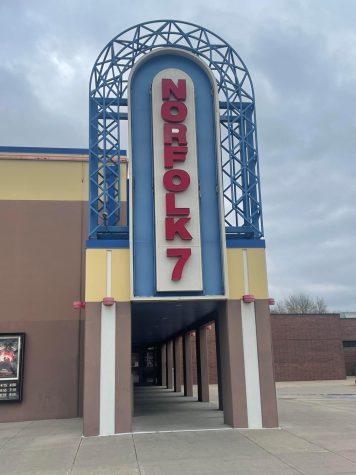A look at the short films up for Oscars
February 4, 2016
By Steven Rea
War and conflict (ethnic, religious, domestic) dominate the field in the live-action short-films competition for the 2016 Academy Awards.
Although “Ave Maria,” from Arab Israeli filmmaker Basil Khalil, is comedic in tone, its depiction of the wariness in the dealings between Israelis and Palestinians speaks to a more serious, troubling reality. A family of Jewish settlers crash their car outside a convent. It’s the Sabbath, so the husband is unable to use a phone to call for help, and the nuns who have let them in have taken a vow of silence. When the husband finally does reach a taxi company, it’s run by Palestinians. That simply won’t do.
“Day One,” from American director — and Army veteran — Henry Hughes, is set in Afghanistan. It’s an intense 24 minutes that follows an Afghan American translator, Feda (Layla Alizada), on her first sortie with her unit — a sortie in which an IED blows up, and in which a suspected terrorist’s pregnant wife goes into labor. The new “terp” finds herself assisting in the delivery because religious custom prohibits a male doctor, a stranger, from entering the woman’s home. The childbirth is fraught with difficulty. Hughes, a paratrooper who did two combat tours in Afghanistan, based his story on the experiences of a real-life Army interpreter.
“Shok,” set in Kosovo in 1998, offers a grim look at the ethnic war that took thousands of lives and left families shattered, homeless, without a country. The film, from British director Jamie Donoughue, follows a boy, Petrit (Lum Veseli), and his best friend, Oki (Andi Bajgora), as they get caught in the middle of warring Serbs and Albanians. The boys’ bicycle serves as a metaphor for freedom, for flight, but also for innocence lost. A searing reminder of the violence and hatred that can infect people separated by language, by culture.
No less intense, and in some ways more disturbing, is “Everything Will Be Okay,” a German film about a divorced father (Simon Schwarz) who collects his daughter, Lea (Julia Pointner), for their allotted weekend together. But when he takes her to get an emergency passport, and then drags her to the airport, a look of worry crosses her eyes. We never find out what leads the dad, Michael, to abduct his child and try to head across the seas, but the half-hour drama is shattering in real and unnerving ways. Director Patrick Vollrath studied film under the maestro of foreboding, Michael Haneke, in Vienna. It shows.
Which brings us to “Stutterer,” written and directed by the Irish-born Benjamin Cleary and set in London, where a reclusive typographer carries on a relationship with a woman he’s never met — they message and text each other, he studies her Facebook page for clues to her life. Then, she sends him a note announcing that she will be in London. Does he want to meet — in person? He (a terrific Matthew Needham) doesn’t know what to do: Hobbled by a serious stutter, he literally cannot get the words out of his mouth. His dilemma — torn between longing and dread — is palpable.
It isn’t just because there is no war, no family horrors, going on that makes “Stutterer” the most compelling of the five nominated live-action shorts. It’s because Cleary brings us wholly into the earnest, insecure, smart, funny mind of its protagonist. And yes, because it offers hope, too.
ANIMATED SHORT FILMS
Old school and new school, color pencils and touchscreen styli, a wide range of formats and techniques are represented in the Oscar-Nominated Short Films 2016: Animation program, and that’s a good thing. The five nominated shorts, and the four additional “highly commended” titles that make up the theatrical package, use computer animation, hand-drawn animation, stop-motion animation, and in several cases, a mix of all three.
The stories aren’t too shabby, either.
Among the standouts: “Bear Story,” from the Chilean animation studio Punkrobot. Director Gabriel Osorio’s gorgeous tale of a sad old bear who constructs an elaborate mechanical diorama is a marvel of invention (watch the “making of” video on Punkrobot’s site, www.punkrobot.cl
Austin, Texas, animation legend Don Hertzfeldt’s “World of Tomorrow” is the other gem here. It doesn’t have the polished sheen of CGI, but its primitive stick-figure drawings belie an immensely sophisticated, forward-thinking view. Incorporating the tricky concepts of time travel, cloning, and human (and machine) consciousness, Hertzfeldt’s toon follows its young heroine, Emily Prime, as she communes with her future clone on the “outernet,” a neural network full of collective memories. In just 17 minutes of beautifully simple cartooning, Hertzfeldt travels the space-time continuum, getting a surer handle on things than Christopher Nolan did in his big-screen epics “Inception” and “Interstellar.”
Speaking of space, the Russian short “We Can’t Live Without Cosmos” follows a pair of brotherly cosmonauts as they train for their expedition beyond Earth’s gravitational pull.
Old traditions and new media collide in “Sanjay’s Super Team,” about a father at his prayer altar, meditating and ohm-ing, and the son at his video console, playing superhero games. The Pixar short was shown in front of the fall release “The Good Dinosaur.” So, unlike its fellow Oscar nominees, it has actually been seen by a lot of people.
Parental warning: Richard Williams’ hand-drawn “Prologue,” also vying for the Oscar, is not for kids. The animation innovator behind “Who Framed Roger Rabbit” has long been working on a project about ancient warfare, and this short, full of drawings come to life, is a study in bloody combat, visceral, full of gore, and male nudity.
———
©2016 The Philadelphia Inquirer
Visit The Philadelphia Inquirer at www.philly.com















